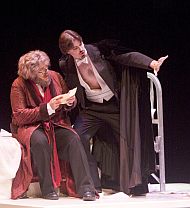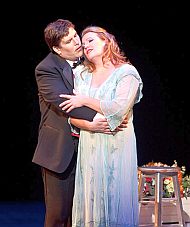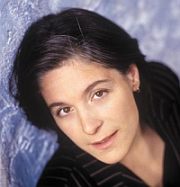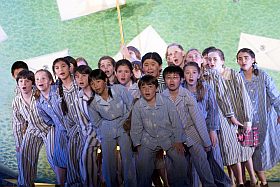A Devilishly Great Faust
Preposterous but true: My two best memories of Gounod's Faust performances come from a gala occasion in Paris 34 years ago and a small regional company's premiere of it on Saturday. A world-class event and Walnut Creek's Festival Opera each hit the spot in its own way.
The first took place in 1975, at the centennial celebration of the Paris Opéra — identified more as the Palais Garnier since the Opéra Bastille became the main home of the National Opera in 1989. What I heard was a tremendous "Faust" gala conducted by Charles Mackerras, with Nicolai Gedda, Mirella Freni, and Roger Soyer. In the Jorge Lavelli production, Max Bignens' set was a huge crystal-palace representation of Les Halles' Baltard pavilions (demolished just four years before, in 1971), which sunk gradually act by act, and the finale took place on the roof (by then it was sitting on the ground).

Against all that state-financed glitter in Paris, Festival Opera offered "only" one thing: Gounod's music. Seldom have I experienced a performance so balanced and "right," with soloists, chorus, and orchestra all blending into a gorgeous ensemble.
Michael Morgan conducted a quiet, unshowy, utterly lyrical performance, with the Act 2 love duet enveloping the Hofmann Theatre audience as if a diaphanous cloud. Among Morgan's heroes: one of the conducting masters of French opera, Julius Rudel — a connection that is easy to hear in this Faust.
I have heard outstanding performances here over the years, but never experienced orchestral playing on this level. Kudos to concertmaster Carla Picchi, oboist Deborah Shidler, clarinetists Diane Malterester and Marilyn Martella. Strings and woodwinds were sensational, the brass didn't rise to that level, and the harp stuck out of the fabric a bit — but the overall sound from the pit was amazing.
Another plus: Festival Opera's all-volunteer chorus shining brightly. James Toland's charges made me sit bolt upright when the offstage chorus first sang. I believe it's a majority or all-volunteer group, so this kind of professional excellence is to be treasured.
Morgan's mastery of the orchestra also extended to the entire cast (which he had selected), all principals sang in a balanced, understated, wonderfully effective way. Brian Thorsett, in the title role, is a young tenor with an unusual, appealing ability to sing simply and effortlessly. Some of the biggest names in opera belt out this role — not Thorsett. He sings the music.

A couple of times, his high notes were a bit awkward, halfway between falsetto and head voice, but "Salut, demeure chaste et pure" was perfection. Thorsett's stage presence is not as natural and winning as his singing, but that can be fixed. Not just "another lyric tenor," Thorsett has something special to offer.
Kristin Clayton, the Marguerite, was a joy, a velvet-smooth voice effortlessly produced, "going big" only on a couple of (appropriate) occasions, but otherwise blending in generously.
Kirk Eichelberger, the Mephistophélès, has earned raves in his still-young career, and he added a major accomplishment to his resume on Saturday. Rather than blowing the walls down — which he could if he wanted to, and if Morgan let him), Eichelberger sang a veritable chamber-music Devil: effective and memorable. Always comfortable on the stage, he ate up the role, but without overdoing it.
Erin Neff's spirited Siébel, Eugene Brancoveanu's sonorous Valentin, and Patrice Houston's comic Marthe were vital parts of the ensemble.
Matthew Antaky is the designer for the simple and effective set, Morgan is also stage director, and he is like a good doctor ... causing no harm. The supertitles — well projected, easy to read — had some peculiarities, such as the consistent mistranslation of "leave me" to "go away!"
But our end should be our beginning: This is an extraordinary Faust out there in Walnut Creek, and there are only two more chances to behold it: Aug. 11 (yes, tonight) and 16. Check it out.
Faust Redux
When Johann Goethe published Faust in 1808 (Part 1, the good bit), he created a whole branch of literature (and drama, opera, film, and the like) about man's search for the ultimate deal, trading an apparently useless soul for youth, dames, untold riches — or the lot. (And let's not forget the echt-American soul-trading for the victory of a baseball team, in Damn Yankees.)In music, Liszt's, Berlioz', and Busoni's take on the legend have been in constant circulation, none more so than Gounod's opera. So, if you're unfortunate enough to miss the Festival Opera production this week, you need to wait only until next summer, and it will be the San Francisco Opera's turn.
It's a promising production, with Stefano Secco in the title role, our own Patricia Racette as Marguerite, other Merola products John Relyea as Méphistophélès, Daniela Mack as Siébel, Catherine Cook as Marthe, and Jose Maria Condemi as stage director. Maurizio Benini conducts.
Guarino's Così: the Anti-Faust
Less than 24 hours after the high of the Festival Opera Faust, I experienced a real low at an unexpected place: the Merola Program's Sunday matinee at Cowell Theater. The program was supposed to be Mozart's Così fan tutte, but instead, I found unbridled Regietheater, director's opera, Robin Guarino's substitution of shticks-by-the-second for the apparently hapless composer's "static opera."

It was a play-within-a-play, with singers carrying scripts for a while, a profusion of shoes strewn about, a singer with one high heel on and the other off, doing a kind of spastic hula-hoop while singing, a stage manager in plain view, the Despina (a greatly talented Caitlin Mathes) doing her own stage-managing ... in all a lot of unrelenting stuff to divert attention from, rather than contribute to or showcase, Mozart's work.
Surely, the opposite of "static" is not — or should not be — maniacal.
Surely, a "concept-opera" that abandons the concept in the intermission burned up its meager ideas too soon ... or came to its senses. Still, consistency is valued by most people.
Just short of the awkward, juvenile carnality of the 2002 Mozart-Adler misfit, La finta giardiniera, this Così is of the same mold: It doesn't trust either the composer or the audience to make it on their own, without the constant interruption and diversion by the director. Wouldn't hiring a couple of audience members to keep coughing through the work be cheaper and more expeditious?
Web Masters, Awake!
Looking for information about the fall portion of the 2009-2010 season, I was surprised by finding nothing on the Web sites of some Bay Area music organizations. There is nada for Composers Inc., S.F. Boys Chorus (other than participation with the Opera), S.F. Girls Chorus, American Bach Soloists (Messiah only?), and so on.
Chamber Music San Francisco, in contrast, already has the schedule on-line, even though it doesn't resume the season until March. Chances are plans have been made well in advance, but not posted for the other organizations. Those waiting until September do themselves no favor.
Ives Quartet: Seriously Playful
The Ives String Quartet — Bettina Mussumeli and Susan Freier (violins), Jodi Levitz (viola), and Stephen Harrison (cello) — explores "The Nature of Playing" in three concerts and a salon series during the 2009-2010 season. The theme is of "how the innately human need for play infuses and informs the creative process of composers and performers." The announcement goes on:
To a string quartet, play of course means performing music with an audience. But play is also central to how we select, learn, and make interpretive choices about music. What brings it all together is the vital interplay of musicians and audience members in those vibrant, inclusive and unique moments when the ephemeral nature of what we do takes life in performance. Join us for an exhilarating season of play and playing. Together we will explore the creative process between composers, performers and our audience.
Featured composers on the season include Beethoven, Mozart, Mendelssohn, Porter, Schubert, Brahms, and a new quartet by Nathaniel Stookey. Concerts are scheduled for Oct. 4 and 9, Jan. 31 and Feb. 5, and May 21 and 23, at Le Petit Trianon in San José and at St. Mark’s Episcopal Church.
S.F. Symphony Gears Up for Action
Monkey-mind here greeted the news of San Francisco Symphony's price reduction of the $25 terrace seats to $15 to mark Michael Tilson Thomas' 15th season as music director by puzzling over hypothetical situations. Suppose MTT celebrates his 40th season (a la Stokowski) — will those seats cost $40? Perhaps more significantly, should this generous gesture apply to what is already a loss-leader, rather than to more expensive, otherwise unoccupied seats. Also, there is a qualifying "at some concerts" in the small print.
But enough of whimsy, let's take the Symphony announcement more seriously. A month before the opening of the 2009-2010 season, SFS has firmed up its plans, and announced a final calendar of programs and artists.

It seems Lang Lang, who opens the season on Sept. 9, will return with the Schleswig-Holstein Orchestra in April, to be the soloist in piano concertos by Mozart and Beethoven.
We can also look forward to the Preservation Hall Jazz Band, Barbara Cook (going strong at 82), Mariachi Sol de México, Cirque de la Symphonie and Pink Martini, Linda Ronstadt narrating this year’s Peter and the Wolf, and the usual crew coming for the "Colors of Christmas" concerts. Ah, yes, it's mid-August, but we are talking (Thanksgiving) turkey, and beyond; no need to wait until next summer for Pops.
As of today, the MTT-SFS recording of Mahler’s Symphony No. 8 and the Adagio from Symphony No. 10 will be available for download through iTunes; it will be released on SACD through SFS Media on Aug. 25.
The second season of the orchestra’s Keeping Score television series, led by MTT, premieres nationally on PBS on Oct. 15 with a one-hour episode about Berlioz and Symphonie fantastique. Other episodes air on Oct. 22 and 29, on Ives and Shostakovich, respectively. SFS also launches its redesigned Keeping Score Web site, with interactive features about the three composers.
If I Were A (Very) Young Man ...

I'd nag my parents until they took me to the San Francisco Boys Chorus auditions in San Francisco, San Rafael, and Oakland on Sept. 12.
Ian Robertson's organization provides education, musical training, good company, participation in San Francisco Opera productions, travel to inaugurations, a Grammy Award — the lot.
No musical experience is necessary to audition for entry level auditionees. Financial assistance is available and "no qualified boy is turned away due to financial need."
Auditions are by appointment only, see the SFBC Web site or e-mail auditions@sfbc.org.
No drop-in, warns SFBC, thus thwarting a really exciting movie story about a young boy wondering into the audition room and then shown receiving adulation in some big opera house, and ...
Vienna Teng In Concert

Former software engineer and genre-bending composer/singer/pianist Vienna Teng is giving a concert on Aug. 14 in Palo Alto, as part of TheatreWorks’ 8th annual New Works Festival.
The Saratoga native started writing and performing songs while studying computer science at Stanford University. After graduating in 2000, she began work for Cisco Systems, but continued with her music career, which she then pursued fulltime after 2002.
Teng’s first album, Waking Hour, made an impressive climb to No. 5 on the Amazon.com best-seller list, and by 2003, she performed on national TV and radio shows, including a Public Television special (during fund-raising, if memory serves). Her latest album, Inland Territory, was released in April.
I wouldn't know what to call her music, but Teng's own description of "chamber folk" seems on the mark. She fuses blues, jazz, folk, and classical. And she says her parents' record collection included "Simon and Garfunkel, James Taylor, Mozart, Beethoven, and 60s Mandarin pop." Let a hundred flowers bloom, my only problem is hearing a certain monotony in her performances — not minimalist ostinato, but a lack of progression.
